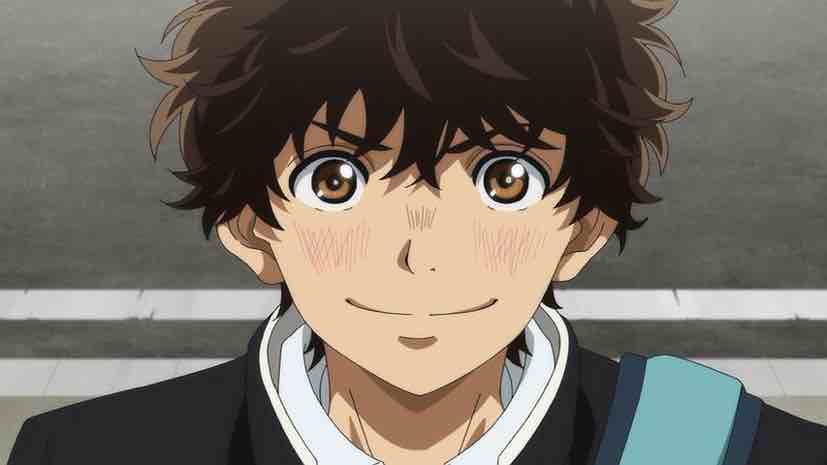 |
 |
 |
 |
 |
 |
 |
 |
 |
 |
 |
 |
 |
 |
 |
 |
 |
 |
 |
 |
 |
 |
 |
 |
 |
 |
 |
 |
 |
 |
 |
 |
 |
 |
 |
 |
 |
 |
 |
 |
 |
 |
 |
 |
 |
 |
 |
 |
「最初のファン」 (Saisho no fan)
“First Fan”
I’ll say this much about Ao Ashi. This sure doesn’t seem like the sort of episode you make if you’re only sticking around for one cour. Getting into the weeds – really fleshing out the details of youth soccer – is something Ao Ashi does exceptionally well. Frankly if it couldn’t include material like this – or had to radically compress it – its overall effectiveness would be pretty badly compromised. But that just calls up just how utterly absurd it would be for this, even among sports manga adaptations generally, to only run 12 or 13 episodes.
Soccer is a sport broadly covered by manga and even anime to be sure. But the slice of the culture this show focuses on is relatively (though not totally) unexplored. Giant Killing is a pretty comprehensive exploration of the professional soccer experience, and Be Blues of the sch ool soccer experience. Ao Ashi does that for youth pipeline soccer – and that means stuff like moving into the dorms, the tension between players in different development channels, and politics among the coaching staff are hugely important. The games are too – but plenty of soccer series focus on that side of the sport.
ool soccer experience. Ao Ashi does that for youth pipeline soccer – and that means stuff like moving into the dorms, the tension between players in different development channels, and politics among the coaching staff are hugely important. The games are too – but plenty of soccer series focus on that side of the sport.
The first part of the experience on arrival for Ashito is groupies – right down to asking for autographs. With the pro team practicing right there Esperion HQ is obviously going to have camp followers, but the girls we meet here are devoted enough to recognize Ashito from the tryouts. Being congratulated and asked for an autograph is a pretty cool way to start your Tokyo soccer experience – and so is seeing Eisaku and Souichirou. It was a foregone conclusion they’d also get picked but Ashito didn’t know that – because he was the only one who didn’t exchange his contact info with the others.
One of the nice things we see here is we see the personalities of the other youngsters starting to emerge. Eisaku is a bit of a boho – a quirky personality, a cheeky haircut, a beret. One gets the idea he’s kind of a hothead but loyal like a faithful hound once he’s in your camp. Souichirou is a worrier, clearly a bit neurotic and insecure, sentimental and seemingly the mothering type. One of the new guys is Kuroda Kanpei (Horie Shun), Souichirou’s roommate. He’s one of the nine junior promotes (less than normal, just as three tryout applicants is more than normal), six of whom are moving into the dorms. Kuroda comes off a nice kid who’s obsessed with proving he belongs.
We’ll see how accurate those reads turn out to be (a test both of the writing and one’s ability to interpret it). It’s clear that resentment exists between the boys in the various channels – more so from the junior side, who probably see the tryout kids (and the one scouted wildcard who shows up late) as late-comers denying them precious youth team slots. This is a zero-sum game, and a harsh business – and it is a business. Pro soccer clubs spend a lot of money on their development pipeline (as witness the comfortable living conditions for a pittance), and expect a return on it – and the competition for a slice of it is fierce.
For Ashito this is an incredibly thrilling experience, and you can easily put yourself in his shoes and see why. Living on his own in a cool pad, all of his essentials covered so he can focus on soccer, new friends, and even fans. The J-leaguers are right next door and he’ll be able to interact with them. The one fly in the ointment could be his roommate Togashi Keiji (Yashiro Taku), a giant central defender who gets dropped off by a biker gang and interrupts the coaches’ briefing session.. But Ashito is not the sort to be intimidated by anybody, and Togashi is friendly enough to him – once he learns Ashito is not a junior youth promote. But Kuroda warns Ashito not to trust this new kid, and he surely has reasons beyond the obvious one.
The exchange between Date and Fukuda – overheard both by Ashito and Hana, who declares herself his first fan – is a bit of a shock moment. It’s one thing for Date to be wary of Fukuda favoring another Ehime kid, who he clearly likes. But to declare outright that Ashito will never make the A-team on his watch? That’s both harsh and unfair – and begs the question of whether there’s something more going on here. Ashito didn’t need to hear that going into the first intrasquad game, where a lot of nervous kids will be trying hard to make an impression. But he already has a support system in place, and seems like the sort of boy who’s going to see that sort of thing as a challenge rather than be deflated by it.
